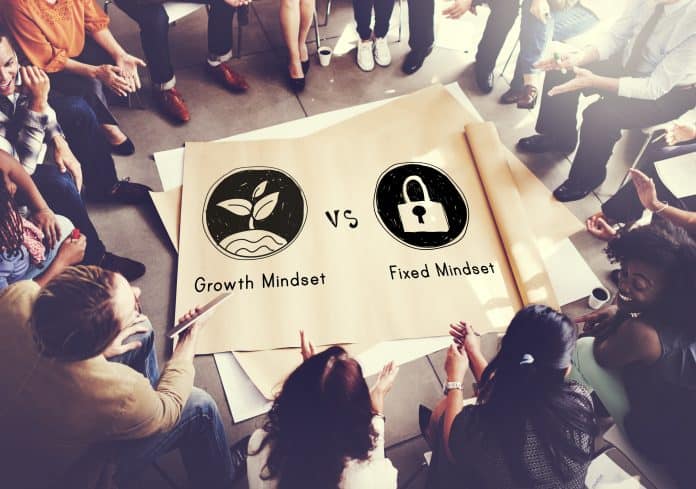
A mindset is a person’s beliefs about their abilities and attributes. Researcher Carol Dweck studied the attitudes people hold about their learning ability and proposed a continuum which has a fixed mindset at one end and a growth mindset at the otheri. The mindset continuum does not deny differences in capability between people but is founded on the premise that people can increase their intelligence through the right learning strategies and effort.
While there is limited evidence to demonstrate a direct impact on academic outcomes and achievement, a growth mindset is useful for learning because it is related to self-efficacy, help-seeking behaviour and the effective use of cognitive strategies. Everyone has a mixture of both fixed and growth mindsets, often with different mindsets in different learning areas. The key is to identify when fixed mindset thoughts and actions occur, and to consciously replace them with more growth-oriented thoughts and behaviours.
The state of the evidence
While Dweck’s original research claimed to demonstrate improved academic performance for students who demonstrated a growth mindset, recent studies that aimed to replicate these findings have found a negligible impact of mindset on both academic outcomes and students’ response to failureii. A meta-analysis of over 150 studies examining the relationship between growth mindset and academic achievement also failed to demonstrate anything beyond a weak correlation, although research has shown that mindset interventions may be beneficial for economically disadvantaged and academically high-risk studentsiii. Given these findings, it is more useful to see growth mindset not as a tool to improve students’ academic outcomes in and of itself, but rather as a way to support students to employ and persevere with effective and impactful learning strategies.
Why are mindsets for learning valuable?
A growth mindset promotes behaviours and beliefs that may help students achieve desired academic outcomes when combined with effective teaching and learning strategies. True learning can be uncomfortable and sometimes fraught with difficulty, confusion and disorientation. Effective learners are not necessarily more intelligent than others but rather are willing to practise and persevere through confusion and challenge. People with a growth mindset believe their abilities and intelligence can be developed and improved through perseverance, good learning strategies and support from others. They are focused on learning rather than demonstrating their intelligence, so they pursue challenges and persevere in the face of difficulty. They demonstrate a willingness to make an effort and to learn from constructive criticism. They are prepared to make mistakes and experience setbacks in order to work out the best ways to adapt their action. They regard error as an everyday, common experience that is integral to the learning process.
A student with a growth mindset tends to:
- believe that learning and growth are possible in all areas
- tackle tasks with confidence that they can manage them
- explore new subjects and interests
- relish challenge, struggle and hard work because they believe this means they are improving
- acknowledge and reflect upon errors and mistakes as a means for improvement
- withstand setbacks, stay on track, and apply more effort when they face difficulties
- understand the value of effort and using strategies to overcome challenges
- see school as full of opportunities to learn
By contrast, a fixed mindset can foster negative perceptions and patterns of helpless responses, including a loss of task enjoyment and motivation, and a lack of effort and persistence. People with a fixed mindset believe that their intelligence and ability are innate and fixed, and there is not much they can do to change it. When they make mistakes, they think it shows a lack in their intelligence or ability. They might choose to ignore useful feedback or disguise poor performance with a lack of effort and motivation. They might also use self-handicapping strategies such as procrastination or setting unrealistic goals, or employ strategies that guarantee success, such as cheating or setting goals too low. They tend to avoid challenges and effort, and give up more easily after setbacks.
A student with a fixed mindset is likely to:
- have confidence and success in a limited realm of actions and performances, but falter when facing difficulty
- see challenges and mistakes as showing inherent deficiencies in their intellectual ability
- avoid challenges and the risk of failure or mistakes
- protect themselves by presenting themselves as capable but unmotivated: ‘If I really cared, I could do well’
- view effort as only necessary for those with lower ability, and feel stupid and incompetent when they have to work hard at something
- stick to tasks and activities in which they can be successful
- desire and seek approval
Using growth mindset to support effective learning
Encouraging students to hold a growth mindset can help them to adopt and use a range of effective learning strategies. Research shows that you can teach students about growth mindset by talking to them about the nature of learning and the role of mindsets in learning, and by creating a classroom culture that supports and promotes growth mindset behaviours and attitudes.
You can help students to develop a growth mindset by teaching them how the brain works and how it changes with learning. Students who are taught about the elasticity of the brain, and that it is possible to grow their brains, tend to do better in academic work. Students need to know that when they stretch themselves to learn something new, the brain forms new connections, and over time intellectual ability can be enhanced. In fact, scientists have discovered that learning is more effective and new knowledge is retained for longer when students encounter a degree of what are known as ‘desirable difficulties’, rather than when they practise things they already know (although it should be noted that this does not mean that learning should be made more difficult per se).
A classroom than supports and promotes growth mindset is one in which effort is expected and valued, although it is important to avoid praising fast and easy work or answers: this kind of endorsement discourages children from sticking with a challenge and working hard, and students might come to think that doing things quickly and easily is valued as a reflection of their ability. When students perform tasks quickly or easily, this may mean that the work did not challenge them and very little learning occurred. An important caveat is that you must value effort that leads to learning rather than praising effort for its own sake. Avoid praising effort when students do not actually learn anything, and do not accept effort as a good enough response.
As part of emphasising productive effort, focus on processes such as challenge-seeking, focus, hard work and the use of effective strategies such as spaced practice and retrieval, rather than outcomes. Be honest about students’ mistakes and failures, and empower the student by expressing confidence that you can work together to address their learning needs. Growth mindset feedback may be used to inform students as to where they are in their learning and what they need to do to improve.
A growth mindset-oriented classroom culture embraces challenge. Whenever a student faces a challenge or gets stuck, frame it as an opportunity for learning or for growing the brain. Be excited and positive, celebrating the moment as an opportunity for new learning. It is important to ensure an appropriate level of difficulty because making learning too easy leads to a false sense of mastery without deeper processing. Allow students to struggle and avoid jumping in to fix every problem. This gives students the opportunity to work through problems, figure out answers and develop or select appropriate strategies for themselves. Offering help before the student has engaged in productive struggle conveys the message that their frustration should be minimised and prevents students from developing resilience and problem-solving skills.
Valuing and normalising mistakes demonstrates that they are part of learning. Make your own mistakes visible and express an interest in mistakes as an opportunity to learn to do something differently. To reflect this, you might use a green pen rather than red for marking. Ensure that students understand that tests and marks do not measure intelligence but rather their performance at a particular moment in time, and offer opportunities for students to plan strategies to improve. Analyse the most common errors on a test with the whole class – students may place less significance on future errors when they realise they are not alone in making errors.
Another way to encourage a growth mindset and support learning is to value risk-taking and having a go by creating opportunities for students to try new things in fun, low-stakes ways and highlighting the incremental progress made through effort and practice. Choosing activities in which there is no single right answer can encourage students to take on new challenges. You can also encourage students to diversify their strategies when they get stuck. Coach students on the need to change strategies or ask for advice from others when existing strategies have not been successful. Effort in itself is not enough to ensure learning if that hard work is wasted on ineffective learning strategies.
References
Davis, V. W. (2016). Error reflection: Embracing growth mindset in the general music classroom. General Music Today, 30 (2), 11-17. doi:10.1177/1048371316667160
Dweck, C. (2014). Teachers’ mindsets: ‘Every student has something to teach me’. Educational Horizons, 93(2), 10-15.
Dweck, C. (2012). Mindsets: How to motivate children (and yourself). Educational Horizons, 91(2), 16-22.
Dweck, C. S. (2016). Mindset. New York: Random House.
Li, Y., & Bates, T. C. (2019). You can’t change your basic ability, but you work at things, and that’s how we get hard things done: Testing the role of growth mindset on response to setbacks, educational attainment, and cognitive ability. Journal of Experimental Psychology: General, 148(9), 1640.
Meyer, L. H., McClure, J., Walkey, F., Weir, K. F. & McKenzie, L. (2009). Secondary student motivation orientations and standards-based achievement outcomes. British Journal of Educational Psychology, 79, 273-293.
Miller, D. L. (2013). Got it wrong? Try again. And again. Kappan, 94 (5), 50-52.
Sisk, V. F., Burgoyne, A. P., Sun, J., Butler, J. L., & Macnamara, B. N. (2018). To what extent and under which circumstances are growth mind-sets important to academic achievement? Two meta-analyses. Psychological Science, 29(4), 549-571.
Veronikas, S. & Shaughnessy, M. F. (2004). A reflective conversation with Carol Dweck. Gifted Education International, 19, 27-33.
Yeager, D. S., & Dweck, C. S. (2012). Mindsets that promote resilience: When students believe that personal characteristics can be developed. Educational Psychologist, 47(4), 302-314. doi: 10.1080/00461520.2012.722805
Endnotes
i Dweck, 2006.
i Li & Bates, 2019.
iii Sisk et al., 2018.
By Dr Vicki Hargraves

